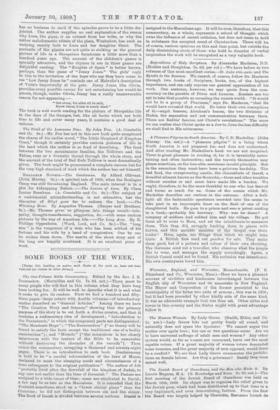SOME BOOKS OF THE WEEK.
[Under nail heading no notice such Books of the week as hove not Web reserved for review in other forms.] The One-Volume Bible Commentary. Edited by the Rev. J. R. Dummelow. (Macmillan and Co. 7s. 6d. net.)—There must be many people who will find in this volume what they have long been looking for. It will be well to describe what it is and what it seeks to give its readers. First we find a hundred and fifty- three pages—large octavo with double columns—of introductory matter described as "General Articles." Among these we have "The Creation Story and Science," showing that the primary Purpose of the story is to set forth a divine creator, and that it contains a rudimentary idea of development ; "Introduction to the Pentateuch," in which the component parts are distinguished; "The Messianic Hope"; " The Resurrection" (" no theory will bo found to satisfy the facts except the traditional one of a bodily resurrection") ; and "Miracle" ("the miraculous is too closely interwoven with the texture of the Bible to be removable Without destroying the character of the records"). Then Comes the commentary, occupying a thousand and seventy-eight Pages. There is an introduction to each book. Deuteronomy is held to be "a careful reformulation of the laws of Moses, designed to meet the changing needs and circumstances of a time subsequent to the original publication." The author of Job "probably lived after the downfall of the kingdom of Judah, in any case not earlier than the time of Jeremiah." The Psalms are assigned to a wide range of time ; some are attributed to David; a few may be as late as the Maccabees. It is ()encoded that the Psalmist sometimes stood on a "lower ethical plane" than the Christian; he did not distinguish between sin and the sinner. The Book of Isaiah is divided between several authors. Daniel is
assigned to the Maceabean age. It will be seen, therefore, that this commentary, as a whole, represents a school of thought which owns the influence of recent criticism, but does not cease to hold in substance the accepted creed of Christendom. There will be, of course, various opinions on this and that point, but outside the daily diminishing circle of those who hold to theories of verbal inspiration the work will be recognised as a very valuable book.
























































 Previous page
Previous page